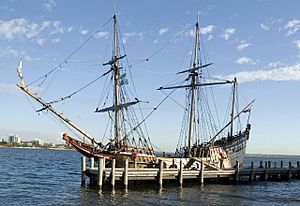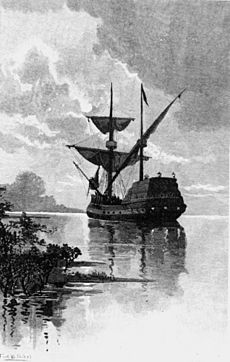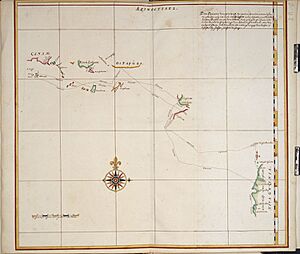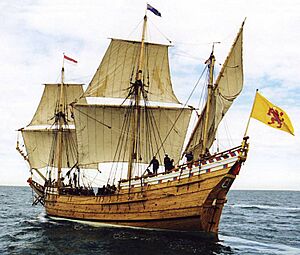Duyfken facts for kids

The 1999 replica of Duyfken in 2006
|
|
| History | |
|---|---|
| Name | Duyfken |
| Launched | 1595 |
| Fate | Condemned beyond repair July 1608 at Ternate |
| General characteristics | |
| Displacement | 110 tons |
| Length | 65.4 ft (19.9 m) |
| Beam | 19.7 ft (6.0 m) |
| Draft | 8 ft (2.4 m) |
| Propulsion | Sail |
| Speed | 7 knots (13 km/h; 8.1 mph) |
| Armament | 8 cannons |
Duyfken (which means "Little Dove" in English) was a small, fast ship from the Dutch Republic built around 1595. It wasn't a big warship, but a nimble vessel perfect for exploring shallow waters, carrying messages, and transporting valuable goods.
The Duyfken is famous for a very important journey. In 1606, with Captain Willem Janszoon in charge, it became the first European ship known to have reached Australia. This was a major moment in the history of exploration!
Sadly, the original ship was badly damaged in 1608 and couldn't be fixed. But the story doesn't end there. In 1999, an amazing replica of the Duyfken was built in Australia so people can see what this historic ship looked like.
Contents
The Adventures of the Duyfken
The Duyfken had a short but exciting life, filled with important missions for the Netherlands.
Sailing for Spices
In the early 1600s, spices like cloves and nutmeg were extremely valuable in Europe. Countries sent ships on dangerous journeys to the Spice Islands (now part of Indonesia) to get them.
In 1601, the Duyfken sailed to the Spice Islands. There, it joined a Dutch fleet that had to face a fleet of ships from Portugal. The Dutch ships won the Battle of Bantam, which was a big deal. It meant that Portugal and Spain no longer had complete control over the valuable spice trade.
After this, the Duyfken helped explore the area and carried cargoes of spices back towards Europe.
A Historic Voyage to Australia

In 1605, the famous Dutch East India Company (often called the VOC) gave the Duyfken a special mission. The VOC was a powerful company that controlled Dutch trade in Asia. They sent Captain Willem Janszoon and the Duyfken to explore the "south and east lands."
Janszoon sailed from Banda in Indonesia, past the coast of New Guinea. In early 1606, he reached the coast of what we now call the Cape York Peninsula in Queensland, Australia. The crew went ashore near the Pennefather River.
This was the first time Europeans are proven to have landed on the Australian continent. Because of this voyage, European mapmakers learned that this massive southern land existed.
The Ship's Final Years
After its historic trip to Australia, the Duyfken continued to work for the VOC. It sailed on missions to get supplies and patrolled the waters around the Spice Islands.
In 1608, the ship was in a long conflict with three Spanish ships. A month later, it was taken to a harbor for repairs. While being fixed, it was damaged so badly that it had to be taken out of service.
Building the Duyfken Again
The story of the Duyfken was so important that a group of people in Australia decided to bring it back to life. They wanted everyone to see the kind of ship that made the incredible journey to Australia.
A Dream Becomes a Ship
The project was started by a group called the Duyfken 1606 Replica Foundation. They raised millions of dollars to build an exact copy of the original ship.
On March 27, 1997, the Crown Prince of the Netherlands, Willem-Alexander, helped lay the first piece of the ship's frame in Fremantle, Western Australia. Shipbuilders used old techniques to make the replica as accurate as possible.
The beautiful new Duyfken was launched on January 24, 1999.

Sailing the World Once More
The replica ship didn't just stay in the harbor. It went on amazing voyages of its own! It sailed to Indonesia and even recreated the original 1606 trip to the Pennefather River in Queensland.
To celebrate the 400th anniversary of the Dutch East India Company, the replica sailed all the way from Sydney, Australia, to the Netherlands. It visited many countries along the way, including Sri Lanka, Mauritius, and South Africa.
Over the years, the Duyfken replica has been displayed in several museums in Australia, including in Perth, Brisbane, and Sydney. It allows people to step on board and imagine what it was like to be a sailor 400 years ago. The ship is located at the Australian National Maritime Museum in Darling Harbour, Sydney, where visitors can see this amazing piece of history.



